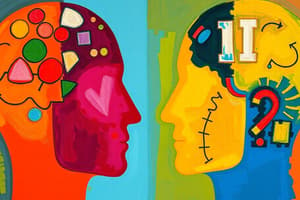Podcast
Questions and Answers
Explain how the concept of 'confirmation bias' can affect a researcher's objectivity when interpreting data. Provide a brief example.
Explain how the concept of 'confirmation bias' can affect a researcher's objectivity when interpreting data. Provide a brief example.
Confirmation bias can lead a researcher to selectively focus on data that supports their hypothesis while downplaying or ignoring contradictory evidence. For example, a researcher studying the effectiveness of a new drug might emphasize positive outcomes while overlooking negative side effects reported by participants.
Differentiate between 'availability heuristic' and 'representativeness heuristic', providing an example of each.
Differentiate between 'availability heuristic' and 'representativeness heuristic', providing an example of each.
The availability heuristic involves making judgments based on how easily information comes to mind (e.g., thinking plane crashes are more common than car crashes because they receive more media coverage). The representativeness heuristic involves judging the probability of an event based on how similar it is to a prototype or stereotype (e.g., assuming someone who enjoys reading poetry is more likely to be a Classics professor than a truck driver).
Describe a scenario where 'anchoring bias' might influence negotiations, and explain how one could counteract this bias.
Describe a scenario where 'anchoring bias' might influence negotiations, and explain how one could counteract this bias.
In a salary negotiation, the first offer made (the anchor) often unduly influences the final agreed-upon salary, even if the initial offer is unreasonable. To counteract this, one should research the average salary for the position beforehand and focus on objective data rather than being swayed by the initial number presented.
How does 'functional fixedness' inhibit problem-solving? Give an example of how overcoming it can lead to a creative solution.
How does 'functional fixedness' inhibit problem-solving? Give an example of how overcoming it can lead to a creative solution.
Explain the 'curse of knowledge' in the context of effective communication. How can communicators avoid this cognitive bias?
Explain the 'curse of knowledge' in the context of effective communication. How can communicators avoid this cognitive bias?
Flashcards
Cognitive Load
Cognitive Load
The mental effort required to process new information.
Intrinsic Cognitive Load
Intrinsic Cognitive Load
Cognitive load related to the inherent difficulty of the material.
Extraneous Cognitive Load
Extraneous Cognitive Load
Cognitive load generated by how information is presented to the learner.
Germane Cognitive Load
Germane Cognitive Load
Signup and view all the flashcards
What causes Intrinsic Load?
What causes Intrinsic Load?
Signup and view all the flashcards
Study Notes
- Intrinsic cognitive load is directly related to the complexity of the to-be-learned material.
Studying That Suits You
Use AI to generate personalized quizzes and flashcards to suit your learning preferences.




